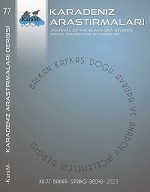ALANYA YÖRESİ AĞIZLARINDA KULLANILAN DEYİMLERDE SAKLI KALMIŞ KELİMELER
THE WORDS HIDDEN IN THE IDIOMS USED IN THE DIALECTS OF THE ALANYA REGION
Author(s): Fatih Numan KüçükballiSubject(s): Language studies, Regional Geography, Sociolinguistics, Turkic languages
Published by: Karadeniz Araştırmaları Merkezi
Keywords: Alanya Dialects; Idioms; Vocabulary; Etymology;
Summary/Abstract: Idioms are stereotyped structures that are mostly unknown when they originated and are a common product of the people. It is possible to encounter words that have remained in historical periods and forgotten today within idioms. In addition, idioms may also contain words that are not used in the standard language and live only in dialects. For idioms living in dialects to be better understood, the words they contain should also be known by the interlocutors. Based on this necessity, around 1500 idioms used in the dialects of Alanya region were scanned and 65 words that are not used in standard Turkish were subjected to analysis. Regarding the idioms used in Alanya region, the work titled Alanya Ağzından Esintiler prepared by Tevfik Hacıhamdioğlu was taken as a source. The etymologies of the words analyzed are shown to the extent that they can be determined. In addition, it has been investigated whether the related words have witnesses in Old Turkish, Old Anatolian Turkish, Ottoman Turkish and other dialects of Modern Turkey Turkish. As a result of the study, it was seen that 11 of the 65 words were Arabic, 4 were Persian and 4 were Greek. No data on the origin of 7 words could be found. The remaining 39 words are thought to be Turkish. 10 words are not included in the Compilation Dictionary; 2 words have a different meaning although they are included in the Compilation Dictionary. 11 words were found to be directly witnessed in the Old Turkish period.
Journal: Karadeniz Araştırmaları
- Issue Year: 2023
- Issue No: 77
- Page Range: 259-277
- Page Count: 19
- Language: Turkish

